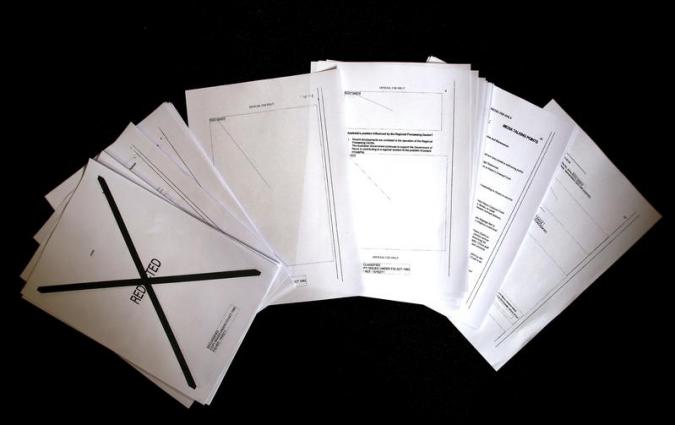In this piece
How Pakistani journalists can ready themselves for a shift to digital

Paper author Ramisha Ali covering a story about a cargo ship that ran aground on the Karachi coastline. Photograph: Tauseef Razi Mallick
In this piece
Build your smartphone kit | Master all the basics | Learn the business | Know your audience | Keep updating your technical knowledge | Train each other | Smash your apps | A daily dose of social media | Showcase your work | Up your CV and LinkedIn gameBangladesh and Pakistan are the countries furthest behind in the digital revolution, according to a report on emerging digital life in South and Southeast Asia published in 2020 by Deloitte and INCLUSION Fintech Conference. Low social and economic development levels have created a huge gap with other countries when it comes to digital infrastructure and mobility penetration.
But neither country can deny that the revolution that has already played out elsewhere is coming to our shores. With increasing internet penetration in Pakistan and greater opportunities in the digital news media market, Pakistani media is on the cusp of a digital transformation. It is time to fully comprehend the skills required to produce truly digital content.
My paper, Preparing to pivot Pakistan’s shrinking news media to digital (download below), considers two online success stories from South East Asian countries facing similar political and economic challenges as Pakistan.
More than ever, it is critical to analyse, reflect, and act on our self-development to remain competitive. What are the essential skills and tools for developing stronger digital journalists in Pakistan?
Build your smartphone kit
Riyaad Minty, the Director of Digital at TRT and one of the founding members of AJ+, told me: "Some of the world's most famous creators are producing on their phones. There is no excuse not to create content right now because it is so simple.”
Invest in a good smartphone and purchase a low-cost tripod with a removable phone bracket on top, a sturdy selfie stick, a wired or non-wired microphone based on your budget, a pair of earphones, a power bank, and a backpack.
Be sure you can quickly edit videos in an easy-to-use application like iMovie, which is sometimes pre-installed on iPhones, or Inshot or Viva video on Android phones. Choose a provider with a steady internet connection, and share files with the newsroom via free online file-sharing services such as WeTransfer.
Master all the basics
Since many digital journalists operate in more than one medium, they must have similar basic abilities as their broadcast or print counterparts. If you are a journalist working in a conventional media newsroom and want to transition to digital, learn how to write for an anchor or a news package, build a large contact list, and improve your picture- and video-editing abilities.
“We always look for a journalist that is outstanding at research, can work in the field independently, can make [photographs] look good in Photoshop with their editing skills, and rapidly edit a video on Premiere Pro,” Laureano Pérez Izquierdo, Director of Infobae America, Argentina told me. Infobae is one of the most successful digital-born news organisations in the Global South, as well as one of the most widely read news websites in the Spanish-speaking world. When discussing the abilities required for digital journalists, he emphasised the need of mastering all fundamentals and working quickly.
Learn the business
Scroll.in's deputy editor, Rohan Venkataramakrishnan, told me: “It is critical for journalists to grasp the business strategies of their organisations.”
In other words: they must understand how the organisations they work for remain sustainable. Discussing money or business is not a typical practise in Pakistani newsrooms. It can be deemed prying or intrusive to do so, but it doesn’t mean learning the news business is impossible.
According to Venkataramakrishnan, the best place to learn the principles is in journalism schools or even at the basic training level of a company. “Keep an eye on how the media is funded in general. Journalists are sometimes wilfully unaware of this aspect of journalism. Journalists should acquire an interest, and knowing the fundamentals is always beneficial.”
Know your audience
“First and foremost, it is critical for a digital journalist to understand their audience deeply,” said Talha Ahad, CEO of The Centrum Media (TCM), Pakistan's first digital news network specialising in video storytelling. Once you've determined your target audience, the fundamental motto in writing for digital is to keep it simple, write to be discovered. Remember that a digital consumer is well-informed and has many alternatives.
Miriam Grace A. Go from digital news organisation Rappler agreed: “We shape our content according to the needs of our audiences. When people find the content that fits their needs, they are naturally drawn to it.”
Keep updating your technical knowledge
Most editors in Pakistani newsrooms are not in their 20s or 30s: they have extensive understanding of the media sector and many Pakistani concerns, but may not be up to date with internet trends. Your comprehension of internet and social media trends can make you a useful employee.
Train each other
Staff at Rappler train each other, Go told me. “For instance, the court reporter teaches court jargon to other staff members, or the tech team teaches [data] analysing and researching techniques.” Rappler also offers continuous learning by inviting speakers and experts from outside to train their staff. This is a culture that should be adopted in Pakistani newsrooms too.
Smash your apps
Greg Kulowiec, a former history teacher and current edtech specialist, created the phrase “app smashing”. He described app smashing as, “the technique of using many applications in combination with one another to execute a final job or assignment.” It's a word more typically associated with educational technology, but can be applied to digital journalism, too. First and foremost, choose a few applications that you are familiar with and incorporate them into your daily routine. For example, using Notes with Voice memos and iMovie and Collect, you can create a simple digital video with subtitles and send it to the newsroom.
In this example, you would use ‘Notes' to write the script and subtitles for your film, ‘Voice memos' to record the voiceover, ‘iMovie' to combine the video, audio, and text, and ‘Collect' from WeTransfer to deliver it.
A daily dose of social media
Social media helps you engage with your audience, and can be a great tool for finding fresh and intriguing leads, creating new contacts, researching your topic, or sharing your work with a large audience. The social media platforms that are extensively used for information sharing in Pakistan, are Facebook, WhatsApp, YouTube, and TikTok. Understanding Twitter and Instagram are also required to create your digital profile.
If you have a solid grasp of content production on key platforms, it might lead to greater opportunities in Pakistan and beyond.
Showcase your work
As a digital or multimedia journalist, you are expected to work in a variety of mediums. It is critical to have an online platform where you can present all of that work, or at least the finest examples of it. Some journalists find it appealing to have a public Facebook profile with a large following that highlights their reach and influence on social media. This does not showcase your work in a user-friendly and creative manner. Look instead for websites that can assist you in creating online portfolios; there are many templates available.
Up your CV and LinkedIn game
For many years, Pakistan's job culture has been based on personal relationships or contacts: having a Curriculum Vitae (CV) was only a formality. With the rise of digital, your CV and online presence have become critical. Keep your CV up to date in the most recent formats. If you apply through a portal for a high-demand position, ensure your CV is in a readable format (.doc, not .pdf), so that it can be read by software used for applicant tracking or analysis.
Create a LinkedIn profile, too. When it comes to networking and seeking a job, this website is really useful. Read the job descriptions for the professions you're interested in, and organisations you are interested in working for, and assess your present skill set to evaluate the gaps you need to address to fit in with growth-oriented digital media organisations.
For those Pakistani journalists who are willing to embrace the changing tide by committing to quality journalism practices that attract loyal audiences, the potential for success is vast.
This project and fellowship have been made possible by the support of the Thomson Reuters Foundation.




